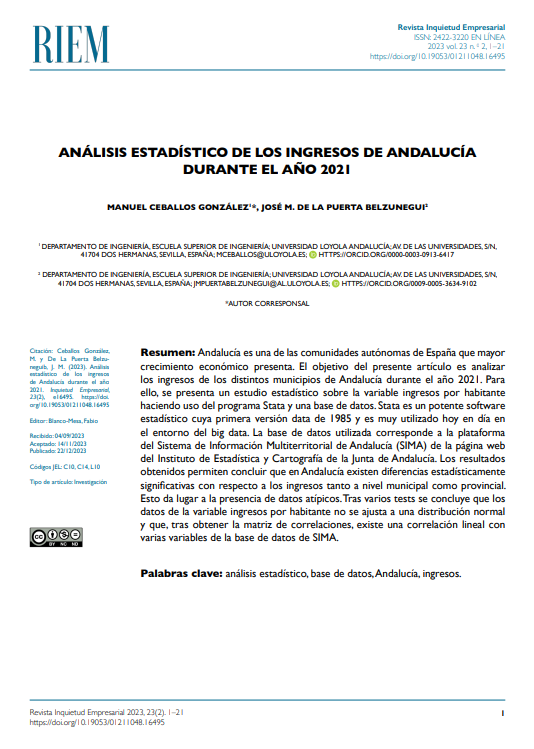Statistical Analysis of the Andalusian Incomes During the Year 2021

Abstract
Andalusia is one of the autonomous communities of Spain with the highest economic growth. The main goal of this paper is to analyse the budgets in every city and town of Andalusia during the year 2021. In order to do so, we have developed a statistic analysis for the variable income per capita by using Stata software and a database. Stata is a powerful statistical software whose first version is from 1985. It is very common to use this software to deal with problems regarding big data. The database considered corresponds to the Mutiterritotial Information System from the website of the Institute of Statistics and Cartography of the Junta de Andalucía. The results obtained allow us to conclude that in Andalusia there are statistically significant differences with respect to both at the municipal and provincial level. This yields to the existence of atypical and highly atypical data. After various tests, it has been concluded that the data for the incomes per capita does not fit a normal behaviour and that there exists a strong correlation between this variable and other variables from the database.
JEL Codes: C10, C14, L10
Received: 04/09/2023. Accepted: 14/11/2023. Published: 22/12/2023.
Keywords
statistical study, database, Andalusia, incomes
References
- Álvaro, C.F., Daniel, D. y Espinosa, I. (2013). El Instituto de Estadística y Cartografía de Andalucía. XIV Congreso de Enseñanza y Aprendizaje de las Matemáticas.
- Akella, S., Diaz, P. & Baluguri, S. (2017). Exam Results Fit to a Normal Distribution. DJ Journal of Engineering and Applied Mathematics, 4(1), 20-28. https://doi.org/10.18831/djmaths.org/2018011002 DOI: https://doi.org/10.18831/djmaths.org/2018011002
- Bernardi, F. y Escobar Mercado, M. (2012). Análisis de datos con Stata (2a. ed.). CIS.
- Campoy-Muñoz, P., Cardenete, M. y Delgado, M. (2015). Análisis estructural a través de Matrices de Contabilidad Social: una aplicación a la economía andaluza para el período 2005-2010. Revista Perspectiva Socioeconómica, (1), 7-28. https://doi.org/10.21892/24627593.211 DOI: https://doi.org/10.21892/24627593.211
- Cardenete, M. A. y López, J. M. (2015). Análisis de sectores clave a través de Matrices de Contabilidad Social. El caso de Andalucía. Estudios de Economía Aplicada 33(1), 203-222.
- Congregado, E. y García, J. I. (2002). El problema de desempleo en la economía andaluza (1990-2001): análisis de la transición desde la educación al mercado laboral. Economic Working Papers at Centro de Estudios Andaluces, E2002/17.
- Conserjería de Economía, Conocimiento, Empresas y Universidad de la Junta de Andalucía. (2018). Análisis de las Cadenas Globales de Valor en Andalucía. Junta de Andalucía.
- Cruces, E.M., de Haro, J. y Sarrión, M.D. (2009). Análisis estadístico de la realidad socioeconómica en Andalucía. Una aproximación a escala municipal. Investigaciones Regionales, (18), 107-138.
- Egea, R. y Luque, P.L. (2018). Instituto de Estadística y Cartografía de Andalucía (IECA): fuentes de datos [Trabajo fin de grado]. Universidad de Sevilla. https://idus.us.es/handle/11441/77593
- Gutiérrez, E. y Arévalo-Quijada, M. (2006). Análisis de la influencia de la temperatura en la demanda residencial de energía eléctrica en Andalucía. Revista de Estudios Andaluces, 26, 93-122. https://doi.org/10.12795/rea.2006.i26.04 DOI: https://doi.org/10.12795/rea.2006.i26.04
- Instituto de Estadística y Cartografía de Andalucía. (2017). Análisis de las Cadenas de Valor en Andalucía: Propuesta Metodológica y Estimación de la Participación Regional.
- Instituto de Estadística y Cartografía de Andalucía. (2021). Informe Económico de Andalucía 2021 y Andalucía en cifras. Instituto de Estadística y Cartografía de Andalucía.
- Instituto de Estadística y Cartografía de Andalucía. (2021). Andalucía Pueblo a pueblo. Fichas municipales: Ingresos por habitante (euros). Junta de Andalucía. https://www.juntadeandalucia.es/institutodeestadisticaycartografia/sima/info.htm?f=k03
- Jadraque, E., García, J. & Estrella, A. (2011). Development of an energy model for the residential sector: Electricity consumption in Andalusia, Spain. Lancet 43,(6) 1315-1321. https://doi.org/10.1016/j.enbuild.2011.01.016 DOI: https://doi.org/10.1016/j.enbuild.2011.01.016
- Junta de Andalucía (2023). Sistema de Información Multiterritorial de Andalucía. https://www.juntadeandalucia.es/institutodeestadisticaycartografia/sima/index2.htm
- Kano, L., Tsang, E.W.K., & Yeung, H.Wc. (2020). Global value chains: A review of the multi-disciplinary literature. Journal of International Studies, (51), 577–622. DOI: https://doi.org/10.1057/s41267-020-00304-2
- Pérez, M., Sánchez, I. y Espasandín, F. (2017). La propensión exportadora de la economía social andaluza: análisis clúster. REVESCO. Revista de Estudios Cooperativos, (125), 159-186. DOI: https://doi.org/10.5209/REVE.57060
- Pita, M. y Mateos, B. (2011). Tercer Informe de Desarrollo Territorial de Andalucía. Secretariado de Publicaciones de la Universidad de Sevilla.
- Román-Collado, R. & Carmona, M. (2021). Energy efficiency’s key role in explaining the performance of energy consumption in Andalusia (Spain). Environmental Science and Pollution Research, (28), 1-21. https://doi.org/10.1007/s11356-020-11829-2. DOI: https://doi.org/10.1007/s11356-020-11829-2
- Tejedor, M. (2022). Más allá del acento: la otra historia de la economía andaluza [Trabajo fin de grado inédito]. Universidad de Sevilla.
- Universidad Loyola (2021). Guía de Stata. Universidad Loyola.
